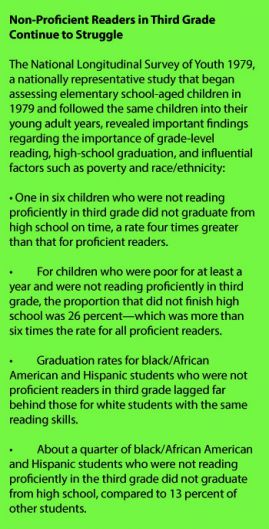Brown Elementary School students discussed the actions of a boasting rabbit and patient tortoise in Gayle Corey’s third-grade class as they considered characters, setting, problem and solution in Aesop’s classic fable.
Then Corey challenged them to write a summary.
“Go back, re-read, and try to find all the information yourself,” said the Byron Center Public Schools teacher, as the students considered the story elements.
 While exploring the antics in “The Tortoise and the Hare” may seem like a fairly lighthearted part of the school day, Corey’s students’ ability to read, comprehend and provide information about such a story is eyed as critical by education leaders. Research clearly indicates that if children aren’t reading well in third grade they will struggle in grades to come.
While exploring the antics in “The Tortoise and the Hare” may seem like a fairly lighthearted part of the school day, Corey’s students’ ability to read, comprehend and provide information about such a story is eyed as critical by education leaders. Research clearly indicates that if children aren’t reading well in third grade they will struggle in grades to come.
Third grade is the big transition year when students’ literacy should start to become fluent enough to “read to learn” rather than to “learn to read.” Recent proposed legislation is zeroing in on that expectation.
The controversial two-page House Bill 5111, proposed by State Rep. Amanda Price, calls for holding back any third grader for a year who doesn’t pass the reading portion of the state exam. It is tie-barred (a bill connected with other bills that would not take effect unless all are approved) to House Bill 5144, proposed by State Rep. Thomas Stallworth, which focuses on protocols for early assessment and interventions to increase student proficiency
If the law passes, state reports indicate 33,000 students or more would be retained in third grade because of non-proficient scores.
Not a One-Size-Fits-All
Locally, school leaders said the goal of reading proficiency for all is great, but they don’t agree with a law mandating retention. Parents and teachers should have a say in the decision, they said, and some research indicates social implications of holding a student back are negative.
“Our goal is to make it more about assessment and intervention and maintain retention the same as it is today. It is an option but it is not the only option,” said Ron Koehler, Kent ISD assistant superintendent.
Thirty-one states have some kind of regulatory language on third-grade reading and retention. Of those, only 14 require retention based on reading proficiency, according to the report “Third Grade Reading Policies” from the Education Commission of the States.
Also up in the air is the standard of measurement for Michigan third graders. The state has not finalized what test students will take beginning next year. Instead of taking the Michigan Educational Assessment Program, or MEAP tests, students will begin taking a Common Core-aligned test next spring.
Keeping on Track
Regardless of legislation, it’s very important for children to be reading well enough to be successful in other content areas before moving onto fourth grade, said Kari Anama, executive director of Instructional Services for Byron Center Public Schools.
“Literacy is the number one pivotal skill that affects everything,” Anama said. “You spend so much time in K-3 with reading strategies and learning to read and learning to comprehend. That shift begins in fourth grade where you are reading to get more information and learn about other things.”
Anama said the real key is identifying struggling readers early. She said intervention is helpful as soon as students begin letter and sound recognition.
“It’s not just magically appearing in third grade. It’s that K-3 reading experience. I like to catch things in kindergarten. If students don’t know all their letters and sounds and are readers in kindergarten, they are not ready to go on to first grade,” she said.
Brown Elementary School’s approach is to know how every student is progressing and build instruction into the day, Anama said. Every six weeks staff members meet as a team to talk about every child, move them up a group or revise their plan to better meet their needs.
Following the whole-class reading session, Corey’s students and three other third-grade classes break into small groups led by teachers, paraprofessionals and interventionists to read at their own level. Advanced readers participate in enrichment activities. Those at grade level keep on pace to continue advancing, and struggling readers work on intervention activities in very small groups.
The team of reading specialists includes an academic support interventionist, a paraprofessional and a support coach.
“We look to see what’s working and what’s not working,” Anama said, noting staff will revise their approach with students not showing progress.
Brain Development Plays a Role
There are many factors that contribute to how well children read, and a big one is brain development, said Bob Fidler, Comstock Park curriculum director and former elementary school principal.
“When you read something you have to use visual and auditory information, your memory sense. You have to be able to predict. You’re really using all parts of your brain,” Fidler said.
Children typically are able to make important connections needed for reading comprehension at 8 or 9, but like learning to talk and walk, reading skills progress at different paces. If obstacles like poverty and lack of support at home are present, those brain connections often don’t develop as quickly.
 “You can’t predict the home life of a child, the background experience, the nutrition. They come to us, and we take them as they are,” Fidler said. “If students don’t have that connection, the third- and fourth-grade teachers should be going all the way back and building those skills up until students become connected.”
“You can’t predict the home life of a child, the background experience, the nutrition. They come to us, and we take them as they are,” Fidler said. “If students don’t have that connection, the third- and fourth-grade teachers should be going all the way back and building those skills up until students become connected.”
The problem is those teachers are supposed to be teaching content.
“So you have the great debate,” he said.
CONNECT
Kent ISD Third-grade Proficiency by the Numbers
“Third-Grade Reading and Reality” column by Ron Koehler, Kent ISD assistant superintendent
“Double Jeopardy: How Third-grade Reading Skills and Poverty Influence High School Graduation” by Professor Donald J. Hernandez, Annie E. Casey Foundation








